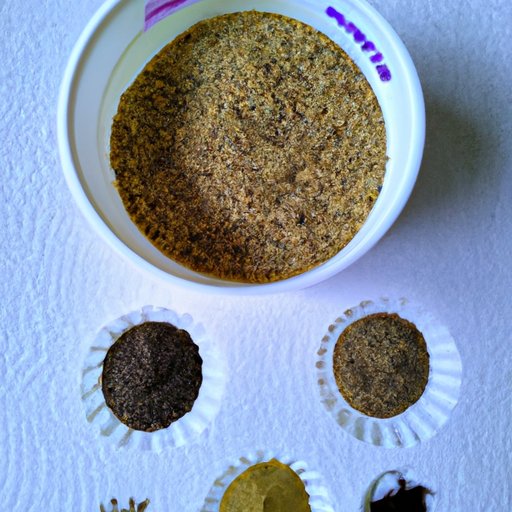Introduction
Cumin is an incredibly popular spice used throughout the world, particularly in Indian and Middle Eastern cuisine. This aromatic and flavorful spice can be found in dishes ranging from tacos to curries and is often used in combination with other spices like coriander, turmeric, and chili powder. But beyond its culinary uses, cumin has long been touted for its potential health benefits.
What is Cumin?
Cumin (Cuminum cyminum) is an annual flowering plant that belongs to the Apiaceae family. Native to the Mediterranean region and India, cumin is a small seed which has a warm, nutty aroma and earthy flavor. The seeds are typically dried and ground into a powder before being used in cooking. Cumin is available in whole seed form or ground, and both forms can be used in a variety of recipes.
Overview of Health Benefits
Cumin has been used in traditional medicine for centuries due to its purported health benefits. While research is limited, some studies have indicated that cumin may offer certain health benefits such as improved digestion, reduced inflammation, and better blood sugar control. Additionally, cumin contains a range of vitamins and minerals that can contribute to overall health and wellness.
Benefits of Cumin for Health and Wellness
Nutritional Profile
Cumin is a good source of essential vitamins and minerals including iron, manganese, magnesium, calcium, phosphorus, zinc, selenium, and vitamin A and C. It also contains dietary fiber, protein, and healthy fats. One tablespoon of cumin contains approximately 7 calories and 1 gram of fat.
Antioxidant Properties
Cumin is rich in antioxidants, which are compounds that help protect your cells from damage caused by free radicals. Free radicals can lead to oxidative stress, which is linked to a number of chronic diseases. Studies have shown that cumin extract can reduce oxidative stress in animals, indicating that it may have similar effects in humans.
Digestive Benefits
Cumin has long been used as a digestive aid due to its carminative properties. Carminative herbs, spices, and supplements are said to help reduce gas, bloating, and stomach discomfort. Studies have indicated that cumin may help reduce symptoms of irritable bowel syndrome (IBS) such as abdominal pain, bloating, and diarrhea. Additionally, cumin may help reduce indigestion and improve overall digestion.
Anti-inflammatory Effects
Inflammation is a normal immune response that helps fight off infection and heal injuries. However, chronic inflammation can lead to a range of conditions and diseases. Studies have shown that cumin extract may help reduce inflammation in the body, which could potentially help reduce the risk of chronic diseases such as heart disease and diabetes.
Potential Blood Sugar Benefits
Cumin may also have beneficial effects on blood sugar levels. Studies have indicated that cumin extract may help reduce fasting blood sugar levels and improve insulin sensitivity in people with type 2 diabetes. Additionally, cumin may help reduce post-meal blood sugar levels in people with type 1 diabetes.

How to Add Cumin to Your Diet
Spices and Herbs
Cumin is a versatile spice that can be used in a variety of dishes. It can be added to soups, stews, curries, rice dishes, and bean dishes for added flavor and nutrition. Cumin can also be used to season vegetables, meats, and fish. Additionally, it can be used to make sauces and marinades.
Cooking with Cumin
When using cumin in cooking, it’s best to add it at the beginning of the cooking process to allow the flavors to meld. Cumin is often used in combination with other spices, so it’s important to adjust the amounts to suit your taste. As a general rule of thumb, one teaspoon of cumin should be enough to flavor a dish for four people.
Adding Cumin to Smoothies and Juices
Cumin can also be added to smoothies and juices for a nutritional boost. Simply add a teaspoon of cumin to your favorite smoothie or juice recipe for a unique flavor and additional health benefits. You can also sprinkle cumin onto salads or yogurt for a flavorful kick.

Cumin as a Natural Remedy for Common Ailments
Respiratory Conditions
Cumin has traditionally been used to treat respiratory conditions such as asthma, bronchitis, and colds. Studies have indicated that cumin extract may help reduce inflammation in the airways, which can help alleviate symptoms of these conditions. Additionally, cumin may help reduce mucus production, making it easier to breathe.
Skin Conditions
Cumin is also said to be effective in treating skin conditions such as eczema and psoriasis. Studies have indicated that cumin extract may help reduce inflammation, itching, and redness associated with these conditions. Additionally, cumin oil may help reduce the appearance of scars and stretch marks.
Gastrointestinal Issues
Cumin is said to be an effective remedy for gastrointestinal issues such as diarrhea, constipation, and indigestion. Studies have indicated that cumin extract may help reduce symptoms of irritable bowel syndrome (IBS) such as abdominal pain, bloating, and diarrhea. Additionally, cumin may help reduce indigestion and improve overall digestion.
What Does Science Say About the Health Benefits of Cumin?
Clinical Studies
While research is limited, several clinical studies have been conducted to evaluate the potential health benefits of cumin. A 2016 study found that cumin extract may help reduce fasting blood sugar levels and improve insulin sensitivity in people with type 2 diabetes. Additionally, a 2018 study found that cumin extract may help reduce inflammation and improve symptoms of irritable bowel syndrome (IBS).
Animal Studies
In addition to clinical studies, several animal studies have been conducted to evaluate the potential health benefits of cumin. A 2017 study found that cumin extract may help reduce inflammation in rats with colitis. Additionally, a 2019 study found that cumin extract may help reduce oxidative stress in rats with diabetes.
Is Cumin Safe to Eat?
Potential Side Effects
Cumin is generally considered safe to consume in moderate amounts. However, large amounts of cumin may cause digestive upset, nausea, vomiting, and allergic reactions in some people. Additionally, cumin may interact with certain medications, so it’s important to talk to your doctor before adding it to your diet.
Interactions with Medication
Cumin may interact with certain medications, including blood thinners, insulin, and diabetic medications. Additionally, cumin may interfere with the absorption of certain nutrients, so it’s important to talk to your doctor before adding it to your diet.
Conclusion
Cumin is a popular spice with many purported health benefits. Studies have indicated that cumin may help reduce inflammation, improve digestion, and reduce blood sugar levels. Additionally, cumin is a good source of essential vitamins and minerals. Cumin is generally considered safe to consume in moderate amounts, but it’s important to talk to your doctor before adding it to your diet.
(Note: Is this article not meeting your expectations? Do you have knowledge or insights to share? Unlock new opportunities and expand your reach by joining our authors team. Click Registration to join us and share your expertise with our readers.)
